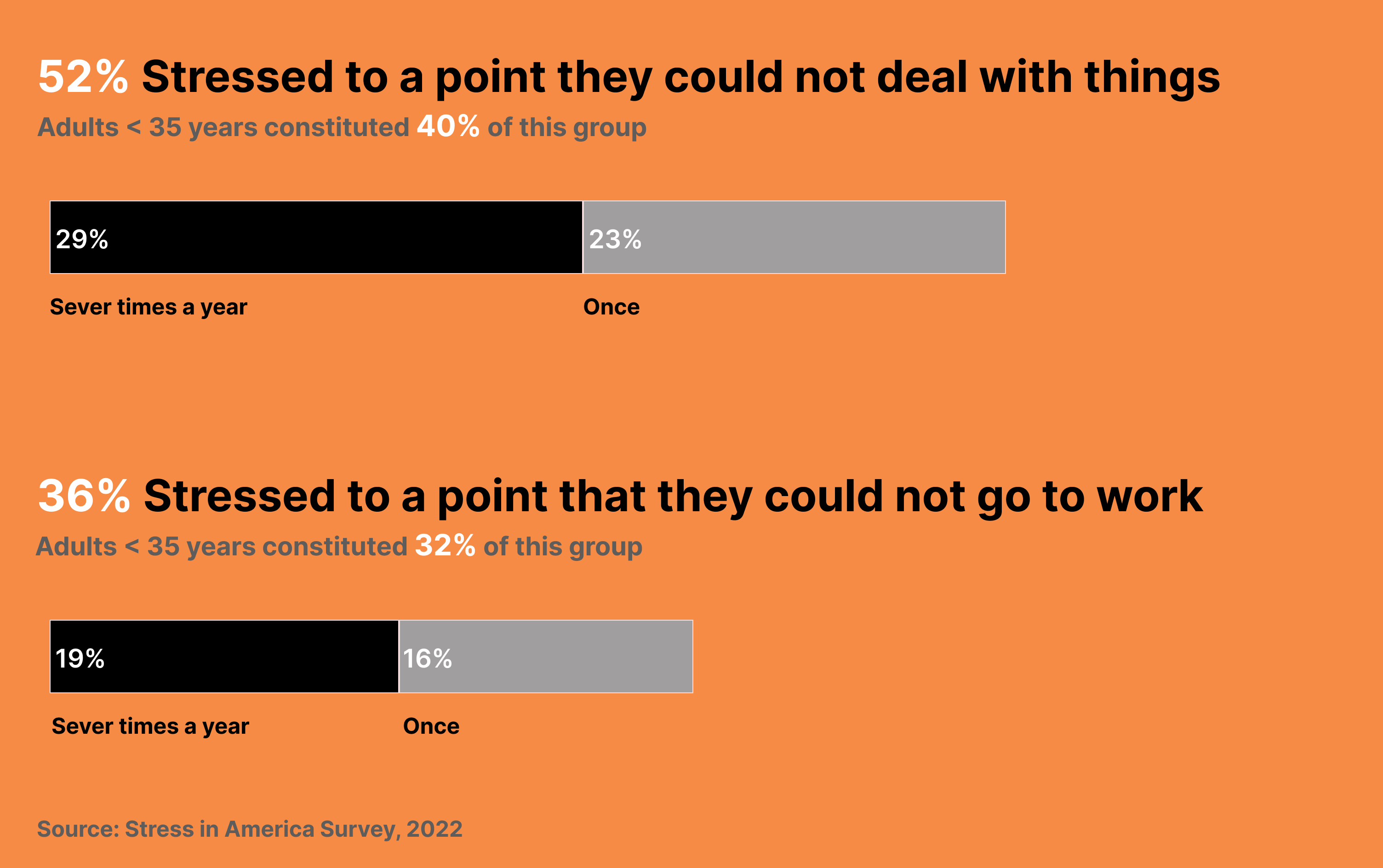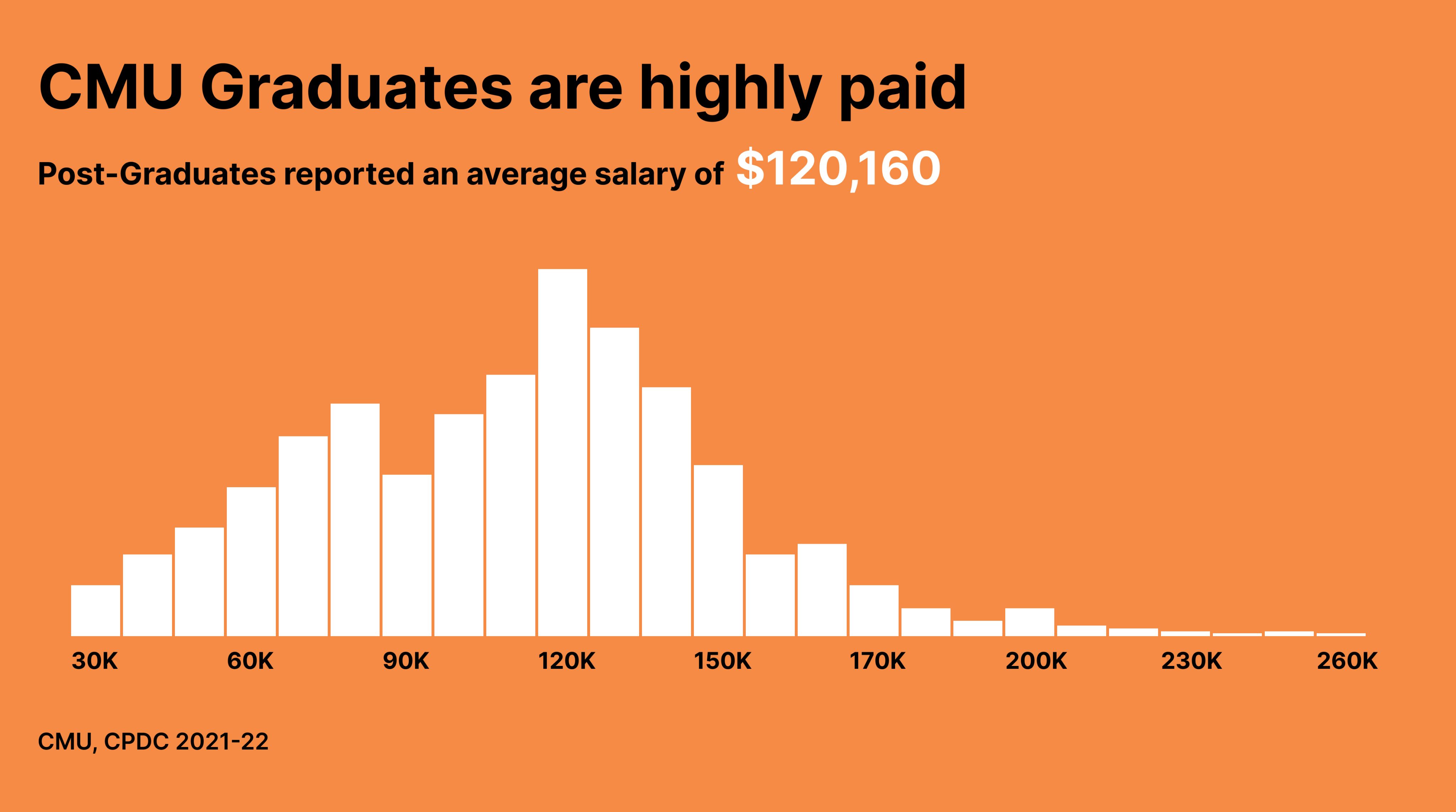Are students ready
to graduate?
A story by Harsh Raj

Students however are seeking something else.
This expectation couldn't have been further from the reality; American professionals eat at their desk, rarely take vacations, barely any family leaves, and often send emails after work hours reported Business Insider2. Further, most of them slog through really long working hours and are overworked.

This has consequences.
An alarming study by WHO found that people who work for more than 55 hrs a week are 35% more likely to have a stroke than people who work 35-40 hrs3. Some other effects include psychological stress, hypertension, increased cortisol levels (primary stress hormone), brain fog, high blood pressure and a host of other health problems4.
This effect is evident in how stressed Americans are.
The Stress in America survey in 2022 reported that 56% of Americans had their lives impacted due to stress in past one year.

Young adults contribute to a staggering 62% of population that is stressed.
Most of them are emotionally unprepared to survive the 9 to 5 workplace.
But, what is stress?
Stress is a normal biological response to a potentially dangerous situation. World Health Organization defines Stress as a state of worry or mental tension caused by a difficult situation5. It's not all bad though, there is good stress as well. In fact, there are multiple types of stress.
1. Eustress - A beneficial form of stress that has a positive effect on performance, health, motivation, and emotion-wellbeing. Its the stress one feels before exams.
2. Acute Stress - It’s the body’s immediate reaction to a new and challenging situation. It’s the kind of stress you might feel when you narrowly escape a car accident.
3. Episodic Acute Stress - This is a frequent form of Acute Stress. This might happen if you’re often anxious and worried about things you suspect may happen.
4. Chronic Stress - When one has high levels of stress for a prolonger period of time, its chronic. Its the most harmful and can cause various health implications.
Chronic Stress causes a constant activation of stress response can cause physical, emotional, and behavioral effects.
Some common physical symptoms include: headache, racing heart, trouble sleeping, high blood pressure, digestive problems, and a weak immune system.
Stress frequently also results in emotional effects like depression, feeling of sadness, anxiety, and panic attacks.

Good thing is that stress is completely manageable.
It starts with an understanding that stress is a part of being human.
Going through a tough time, or having gone through a traumatic event can have long lasting effects. These effects can be both physical and emotional. Acknowledging these effects and trying to understand the cause can be the first step to feeling better notes NHS6.
While different sources recommend different ways to cope with stress, a general consensus is being prepared for it.
Stress can be prevented by building healthy habits. Exercising is one of the proven stress ways to relieve stress. Eating healthy and getting adequate sleep is often the next best ways to manage stress.
Going the extra step and planning for stress can be really helpful. Blocking off small parts of the day to decompress; setting aside 15 minutes for a walk, or 10 minutes after lunch to do something fun can be really helpful.

Connecting with loved ones, practicing gratitude, helping others, taking control, and trying to be positive are all proven ways to deal with stress7.

Find relief in simple breathing exercises.
But know that its important to seek out help when needed.
For Students
Resources to manage Stress:
1. Call 412-268-2922 for immediate help
2. National Health Service, Tips to reduce stress
3. Center for Disease Control and Prevention, Coping with stress
4. Mayo Clinic Health System, 5 tips to manage stress
5. The Muse, 12 Pieces of Advice for New Grads That Everyone Should Take
6. Call or text 988, or chat online at 988lifeline.org
7. National Suicide Prevention Lifeline
For Educators
Understand that students need your help in learning workplace skills or emotional and behavioral standards. Build policies, create courses, talk about mental health and get your students ready for their future by focusing on in-campus wellness programs.
For Corporates
Workplace stress is an epidemic and leads to 7 trillion in lost productivity for companies. Facilitate a healthy workplace by Encouraging Open Communication, Promoting Collaboration, Encouraging Healthy Living, and Creating a positive-work life balance8.
Data Sources
- CPDC, "CMU First destination outcomes". Accessed October 9th, 2023.
- Carnegie Mellon University. "Counseling and Psychological Services (CaPS)". Accessed October 9th, 2023.
- American Psychological Association. "Stress in America 2022TM". Accessed October 9th, 2023.
- American Psychological Association. "More than a quarter of U.S. adults say they’re so stressed they can’t function". Accessed October 9th, 2023.
- American Psychological Association. "Stress in America 2020TM". Accessed October 9th, 2023.
- Mary Christie Institute. "The-Mental-Health-and-Wellbeing-of-Young-Professionals-Survey". Accessed October 9th, 2023.
- The Harris Poll. "Stress in America October 2022 Topline Data". Accessed October 9th, 2023.
- IPSOS. "Majority of adults report experiencing high levels of stress in past year". Accessed October 9th, 2023.
- Business Insider. "11 American work habits other countries avoid at all costs". Accessed October 9th, 2023.
- HBR. "The Dangerous Allure of the 70-Hour Workweek". Accessed October 9th, 2023.
- World Health Organization. "Long working hours increasing deaths from heart disease and stroke: WHO, ILO". Accessed October 9th, 2023.
- Cleaveland Clinic. "5 Side Effects of Working Too Much". Accessed October 9th, 2023.
- Compare Camp. "61 STRESS STATISTICS: 2020/2021 FACTS, CAUSES & EFFECTS". Accessed October 9th, 2023.
- The American Institute of Stress. "What is Stress?". Accessed October 9th, 2023.
- Healthline. "Everything You Need to Know About Stress". Accessed October 9th, 2023.
- National Health Service. "10 stress busters". Accessed October 9th, 2023.
- Mayo Clinic. "5 tips to Manage Stress". Accessed October 9th, 2023.
- Center for Disease Control and Prevention. "Coping with Stress". Accessed October 9th, 2023.
- Cleveland Clinic. "Stress". Accessed October 9th, 2023.

